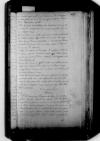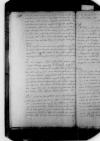Letter #5746
Alfonso de VALDÉS to Ioannes DANTISCUSPalencia, [1527]-09-24
English register:
Valdés is happy that Dantiscus has recovered. Despite his expectations, Alexander [von Schweiß?] has not gained anything from the master of Nassau. Valdés encourages Dantiscus, if he comes to Palencia, not to stay at an inn, inviting him to his own quarters instead. Even the exceptionally foresighted envoy from Portugal [...] was unable to get lodgings with the emperor. Valdés assures Dantiscus that he had no problems after the last time Dantiscus stayed with him. He hasn’t had a letter from the chancellor [Mercurino Gattinara]. The chancellor was supposed to reach Saragossa last Monday [September 23], so he cannot be expected sooner than in 8-10 days. Valdés has decided to stay in Palencia until the following Sunday or Monday in anticipation of news from the chancellor. He will let Dantiscus know what should be done. Not very reliable news has come from Hungary that the voivod [János Szapolyai] has been defeated and Buda captured by the [Archduke] Ferdinand. Everyone is expecting a peace treaty [between the empire and France], but Valdés doesn’t expect it to happen quickly. He sends greetings from the host [himself?] and John.
| received Paredes de Nava, [1527]-09-24 Manuscript sources:
Auxiliary sources:
Prints:
| ||||||||||||||||||
Text & apparatus & commentary Plain text Text & commentary Text & apparatus Excerpts concerning Dantiscus' travels
Clarissimo viro, domino
Salutem plurimam.
Vir clarissime.
Pristinae valetudini te restitutum gaudeo. Sperabam probably
A
Nihil est, quod verearis mihi incommodi futurum, quod tibi hospitium communicaverim. Non tam insaniunt alcaldi nostri. Ego quidem nec verbum ullum de hac re audivi; quodsi ob eam rem aliquid ferendum esset, ferrem equidem animo iucundissimo.
De rebus Ungaricis audivi
Postscript:
Scribe, an tuis globulis aureis aliquid expiscaveris.
[2 ] Probably
[3 ] Alcala has no doubts, that Valdes describes here

